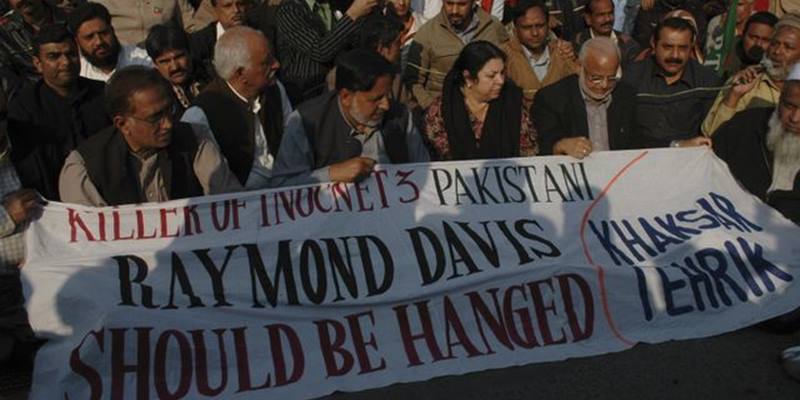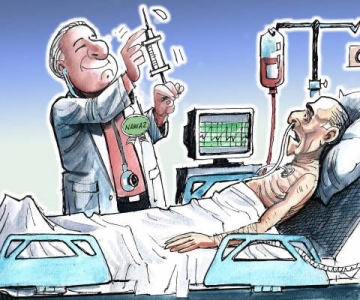By Raza Rumi
Honour politics: More often than not, we as Pakistanis feel that we are not given the respect we deserve as a sovereign nation, and that we are not taken seriously by the international community. We feel unfairly lumped together, with a few bad apples marring our national character through their involvement in terrorism, illegal immigration, and other grave misdemeanours, whereas the vast majority of Pakistanis are peaceful, law-abiding citizens. Now, we have before us an opportunity to prove those who would judge us by our green passport dead wrong, and do the right thing, despite popular protests being whipped up for political gain.
Did US Diplomat Raymond Davis commit cold-blooded murder of two innocent, cellphone-and-gun-loving boys, or was it self-defense against blatant dacoity? The answer is worth investigating but not all that relevant. Davis ostensibly carries a Diplomatic Passport (as stated by our Interior Minister), and he was allowed to travel to Pakistan by our own Foreign Ministry. As galling as it might be to some quarters, we will have to let him go, not because we want to aid and abet murder, but rather, by respecting the long-established principle of diplomatic immunity, we show our strength and stability to the world, and show the international community that we are not a ‘rogue’ or ‘terrorist’ state, but rather one which respects international standards, conventions and agreements.
There is a principle here:
The tradition of diplomatic immunity goes back a long time. In 1814, the Congress of Vienna met to straighten out national borders after the Napoleonic wars. Ambassadors from all major powers redrew Europe’s map and in doing so, specifically noted the strong protection that ambassadors were owed while in host countries. This vision was later codified in the Vienna Convention on Diplomatic Relations, a UN-based conference and treaty to which Pakistan and the United States and are both signatories.
But why agree to a system in which we’re dependent on a foreign country’s whim before we can prosecute a criminal inside our own borders, under our laws? The practical answer is because we depend on other countries to honor our own diplomats’ immunity just as scrupulously as we honour theirs. The concept of diplomatic immunity — safe passage for diplomats in potentially hostile territory — has existed in some form for many centuries. Envoys between armies, traveling under a white flag, have long been accepted as safe from attack. The principle involved isn’t law or treaty so much as Pakistan’s blatant self-interest: if we go after their emissaries, they’ll go after ours.
International law matters:
Today, boldly showing that Pakistan respects the concept of diplomatic immunity is extremely important. We need to make sure that foreign diplomats — especially our own diplomats abroad — do not get jailed for arbitrary or political reasons. By subjecting Raymond Davis to these local court proceedings, we are basically declaring open season on our own representatives overseas to be intimidated and harassed. Furthermore, by ignoring the principle of diplomatic immunity, we are further extricating ourselves from the society of civilized nations. Do we, as a nation, aspire to be taken seriously in international fora, or would we rather join the ranks of tin-pot dictatorships like Belarus, Burma, Zimbabwe and Turkmenistan. It is already hard enough to travel on a green passport. Let us also not make it difficult for Pakistan’s own representatives on international assignments and project the true character of Pakistan as a nation of law and peace.
Why the world honours diplomatic immunity, despite its costs
Rapists, pedophiles, torturers, drug dealers, thieves, arms-smugglers and yes, murderers — these are the kinds of criminals the foreign authorities let slip past their justice system on a regular basis, to the overwhelming chagrin of their public and legislatures. Why? Because the overarching and long-established principle of diplomatic immunity is far too important for any other nation for that matter, to sacrifice for short-term political gains.
Much has been made in the press here of the rare exception of Georgian diplomat, Georgi Makharadze, who killed a 16-year old girl while driving drunk, and that his immunity was waived. However, this was truly remarkable, and in almost every other case, once invoked, diplomatic immunity gets any and all miscreants who have diplomatic immunity off scot-free, and they are quickly whisked home, where they may or may not face trial in their home country.
Examples abound of criminal activity perpetrated by diplomats serving in the US going unpunished due to their immunity. Take the case of the Bangladeshi woman, who was enslaved by a senior Bahraini envoy to the UN and his wife. In 1999, she charged that the couple took her passport, beat her and paid her just $800 for ten months of work, and only allowed out of their New York apartment twice. When she sued her employers, the US Justice Department dismissed the case because the Bahraini envoy and his wife had diplomatic immunity. Salem Al-Mazrooei, apprehended by Virginia police after driving four hours to have sex with who he thought was a 13-year-old girl. He was immediately released once it was clear he was a UAE diplomat, and quickly left the country without prosecution.
In 1984, two Libyan diplomats shot and killed British policewoman, Yvonne Fletcher, from inside the Libyan Embassy in London, and were returned home and never prosecuted. In January 2001, a Russian diplomat in Ottawa, Canada hit two pedestrians with his car, killing one and seriously injuring the other. Andrei Knyazev was previously stopped by police on two different occasions on suspicion of alcohol-impaired driving. Although a request by the Canadian government to waive his immunity was refused, Knyazev was prosecuted in Russia for involuntary manslaughter, and sentenced to four years in prison, serving time in a penal colony.
Under the Vienna Convention, the most a host country can ever do is expel a diplomat, declaring the person persona non grata (PNG), or a person who is officially no longer welcome. If he remains in the country after being PNG-ed, the diplomatic status may be revoked and the diplomat may be arrested like a regular citizen, if remaining there on his or her own free will. In some circumstances, the person committing the crime faces trial in their home country, like the US Marine assigned to the US Embassy there who was involved in a fatal car accident in Bucharest, Romania. He was later court-martialed and convicted of several charges, but not manslaughter.
The crimes by diplomats are also financial, costing the United States a fortune in unpaid fines, taxes and other fees. From 1997 to 2002, foreign diplomats in New York City racked up over 150,000 illegal parking tickets totaling $18 million in fines, and City officials had no means of collecting these. Outrage over the abuse of diplomatic immunity was so widespread that the nationally-televised comedy show ‘Saturday Night Live’ satirically portrayed UN diplomats proposing going to lunch with as many illegally-parked vehicles as possible and in light of their diplomatic immunity, spending the afternoon stealing from a high-end boutique, to the horror of then-Secretary of State Colin Powell. Almost none of tickets were ever paid by foreign missions, nor by their representatives.
Furthermore, everyone knows that the three regimes that the US has its most-antagonistic relationships with: Iran, North Korea and Cuba. Bitter enmity has existed for decades on both sides, and yet each year, US authorities permit their UN Ambassadors, ministry functionaries and even heads of state to romp around New York, making inflammatory, anti-American speeches at the UN and elsewhere. Why would America let these diplomats roam free in its largest city, while at the same time actively opposing their regimes at every turn? Again, the overriding principle is that of respecting diplomatic immunity, and ensuring that international norms are observed in law.
The fact is diplomatic immunity is too vital for the effective execution of statecraft in the modern day. Governments need to ensure that they treat diplomats — even those who commit crimes — as inviolable, so as to ensure that their own envoys and representatives can freely go about their business without fear or risk of persecution and harassment, by an otherwise hostile host nation.
Hysteria in Pakistan
The case of Raymond Davis, unfortunate as it is, has provided the Pakistan’s right wing in the ascendant to whip up anti-Americanism, which has become the greatest emotional banners of our nationalism. The religious parties, soon after their alliance on blasphemy law now, want Davis to be tried and punished or even worse ‘traded’ for Afia Siddiqui. The two cases are different: one involves the murky world of terror networks and the other at best a reckless security ‘advisor’of the US Embassy. Talk show after talk show has condemned the US and its high-handedness and has invoked national pride and the abstract notion of ‘justice’ here. As if by hanging Davis Pakistan will avenge America for its support to Israel to the drone attacks in the northwest. The reality could not be more complex and nuanced. We may hate the US but in these times we have to build and reformulate our bilateral relationship based on mutual respect.
Empty rhetoric will not do. We have to act as a mature, rational nation and discard the policy of blind hatred towards others. More importantly, we need to recognise that until we take care of our internal issues and challenges of poverty, inequality and skewed political participation of the people we cannot be truly sovereign.
A version of this article appeared in The News on Sunday (February 6, 2011)
The writer is a policy advisor and a writer based in Lahore. He blogs at www.razarumi.com and edits a webzine at www.pakteahouse.net.



